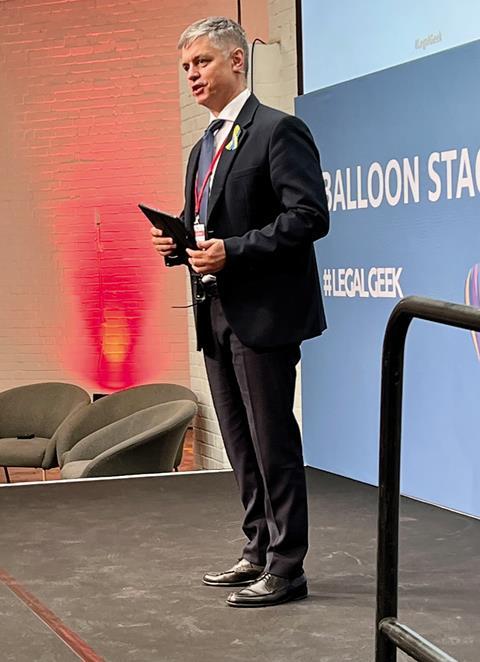Legal Geek’s flagship conference is back at its brash and bullish best, but raising new money is becoming tougher for startups
The past few weeks have seen the lawtech community meeting to discuss how to leverage innovation to succeed in a challenging business environment.

There is general agreement that the best approach is hybrid, exploiting online and automated processes but keeping the human in the loop. This also applies to events, which support inclusivity by offering in-person attendance and online access.
Social responsibility at Legal Geek
The lawtech community’s flagship annual conference, Legal Geek, was back to its previous form, with a sold-out two days in Shoreditch at the end of September. While presentations were dominated by startup and scale-up pitches and a broad range of case studies, the commercial focus was balanced by a strong element of social responsibility.

The opening keynote was delivered by Vadym Prystaiko, Ukraine’s ambassador to the UK. He reflected on his experience as a startup founder, before turning to the current crisis in his country. A section of Legal Geek’s famous Start-Up Alley was dedicated to Ukrainian businesses, and startup pitches included a presentation by Legal Nodes, which featured in the Gazette in May. Polina Lehman, founding member of United for Ukraine (UFU) and Jakub Makowski, the program manager of BRYTER Open, told us about collaborating with UFU to create apps which have helped to process requests from more than 5,000 displaced people looking for legal help with immigration, finance, housing, employment and other aspects of moving to a new country. These came from 500 lawyers in more than 30 countries who have signed up to the UFU platform unitedforukraine.org.
On inclusivity and social mobility, Mary Bonsor, chief executive and co-founder of legal resourcing platform Flex Legal, presented Flex Trainee, an online SQE training programme which works with social mobility charity STRIVE and online training partner BARBRI Global. This enables trainees to qualify without getting into massive debt by combining in-house legal assignments with online learning. Genie AI’s CEO Rafie Faruq presented its Startup Starter Pack.
The pack gives small businesses free access to 30 legal contract templates which they can tailor to their own requirements. These are regularly peer reviewed and updated. In addition to the community resources, a paid subscription provides access to workflow tools, AI contract review and automated drafting.
Legal Geek, which brings together two high-pressure sectors, emphasises the importance of physical and mental health. Previous years have featured fun runs, yoga classes and healthy eating, and this year was no exception. Joe Wicks got everyone moving and attracted a long queue of people wanting to hear his story and meet him (including me!). On mental health, Francesca Bortoli and Lucy Raemers of The Ben Raemers Foundation gave a thought-provoking talk on suicide prevention.
On the data trail
At the Legal Services Board’s conference, Reshaping Legal Services, master of the rolls Geoffrey Vos highlighted three pressing (and related) issues for the legal profession: improving diversity, adopting new technologies, and finding ways for lawyers to add value and be remunerated.
A lot of lawyers’ work is about providing clarification and the volume of available data has complicated legal matters, which then require more technology to resolve.
The pandemic has accelerated progress towards a digital justice system with online hearings and asynchronous decision-making improving accessibility, reducing costs, and allowing for more diversity and inclusion within the profession.
Importantly, technology and its data trail is changing the work that lawyers do. For example, as distributed ledger technology verifies facts, there will be fewer factual disputes. And on the transactional side, self-executing documents which automate legal processes and transactions will require less human involvement.
‘We cannot put the data genie back in the bottle,’ Vos said.
Legal operations as a service
October also saw the CLOC EMEA Summit – a version of the CLOC Global Institute, the massive US peer learning event covering in-house legal operations, organised by the Corporate Legal Operations Consortium.
While large and mid-size law firms continue to invest in legaltech spin-offs and tech partnerships, some larger corporate firms are following the example set by alternative legal service providers and are selling legal operations as services. Examples are Cleary Gottlieb’s Cleary X and Legal Operations by Shearman, launched last week by Shearman & Sterling, which will provide clients with operational support including legal tech, data analytics, and legal department design (see legaloperations.shearman.com).
This is a logical step from law firm spin-off tech companies. If a business is prepared to buy its legaltech directly from its law firm, it may make sense to outsource the operational elements of its legal function. This is particularly relevant for some large companies that have surprisingly small legal departments.
The Legal Services Board’s Reshaping Legal Services conference looked at ethical considerations for legal operations in light of geopolitical issues and corporate decision-making. A panel, moderated by Richard Moorhead, professor of law and professional ethics at University of Exeter Law School, focused on ethical practice rather than technology, asking how an in-house lawyer can be ethical when their company takes unethical or ill-advised business decisions.
Moorhead’s panel, and others around diversity and inclusion, highlighted that data is an important factor in delivering and measuring environmental, social and governance (ESG) initiatives. We saw a lot of stats, backed up by survey data and user feedback, underlining that diversity is still a major challenge for online courts and legal resources, with gaps in tech literacy and impenetrable legalese limiting access to justice.
As these panels and other discussions highlighted, tech and automation may boost efficiency, but it is still important to have a human in the loop, as there needs to be an element of exception handling and oversight to make legal services widely accessible, inclusive and fair.

Fundraising in a downturn
Many of the lawtechs pitching at Legal Geek were looking to raise additional funds, against the background of rising interest rates, and a decline in venture funding of 34% in the third quarter of 2022 (a nine-quarter low and the largest quarterly percentage drop in a decade, according to data from CB Insights).
Legalcomplex (www.legalcomplex.com), which tracks legal tech deals, last week revealed that the value of legal tech funding has fallen by 58% during the first three-quarters of 2022, although deal volume is roughly the same. So there is less money on the table for legaltech startups and scale-ups.
The type of software attracting investors is also changing. Legalcomplex’s CEO Raymond Blijd told Law360 Pulse that contract life cycle management (CLM) and e‑signature offerings dropped out of the top five for the quarter for the first time since 2010. He also said that DocuSign’s stock fell below $50 for the first time since 2019, despite e-signatures being widely adopted and made legally binding during the pandemic.
However, there are new sources of legal tech investment. Here in the UK, the government-funded initiative Lawtech UK received £4m from the Ministry of justice for the second phase of its tech and innovation programme – double its initial investment. The US has seen new funds launched targeting legaltech, notably the venture capital firm The LegalTech Fund, which includes venture capital, tech and innovative law firms as investors, and innovative approaches to fundraising.
Last month, Reynen Court, an online platform that enables law firms and corporate legal departments to select, deploy and manage cloud-based software applications in a secure private cloud (ie, without sharing client data), launched a stock offering aimed at law firm partners. It recently closed its Series A round, raising about $4.3m, and is now looking to raise an additional $5m from the law firm partners and general counsel who use it.
Its founder, Andy Klein, started his career as a securities lawyer at Cravath, Swaine & Moore, before becoming a serial entrepreneur. He floated the first initial public offering on the internet in 1995, and his next business, Wit Capital, was the first online investment bank.
Reynen Court, launched in 2018, is backed by a consortium of major law firms and legal departments. Klein’s rationale for targeting ‘affinity investors’ is to leverage Reynen Court’s community and give its users an interest in the company. It is also a vehicle for raising capital between Series A and Series B funding rounds.
Although Klein is based in Amsterdam, the offering, which uses a provision of the US Jumpstart Our Business Startups Act that makes it easier for early-stage companies to raise capital using the internet, is only open to US accredited investors (high net worth individuals).
Klein says that ‘the timing is right’ for this kind of alternative approach to fundraising, due to lawyers’ increased awareness of the value of technology and market conditions making it harder for tech companies to raise institutional capital.































No comments yet